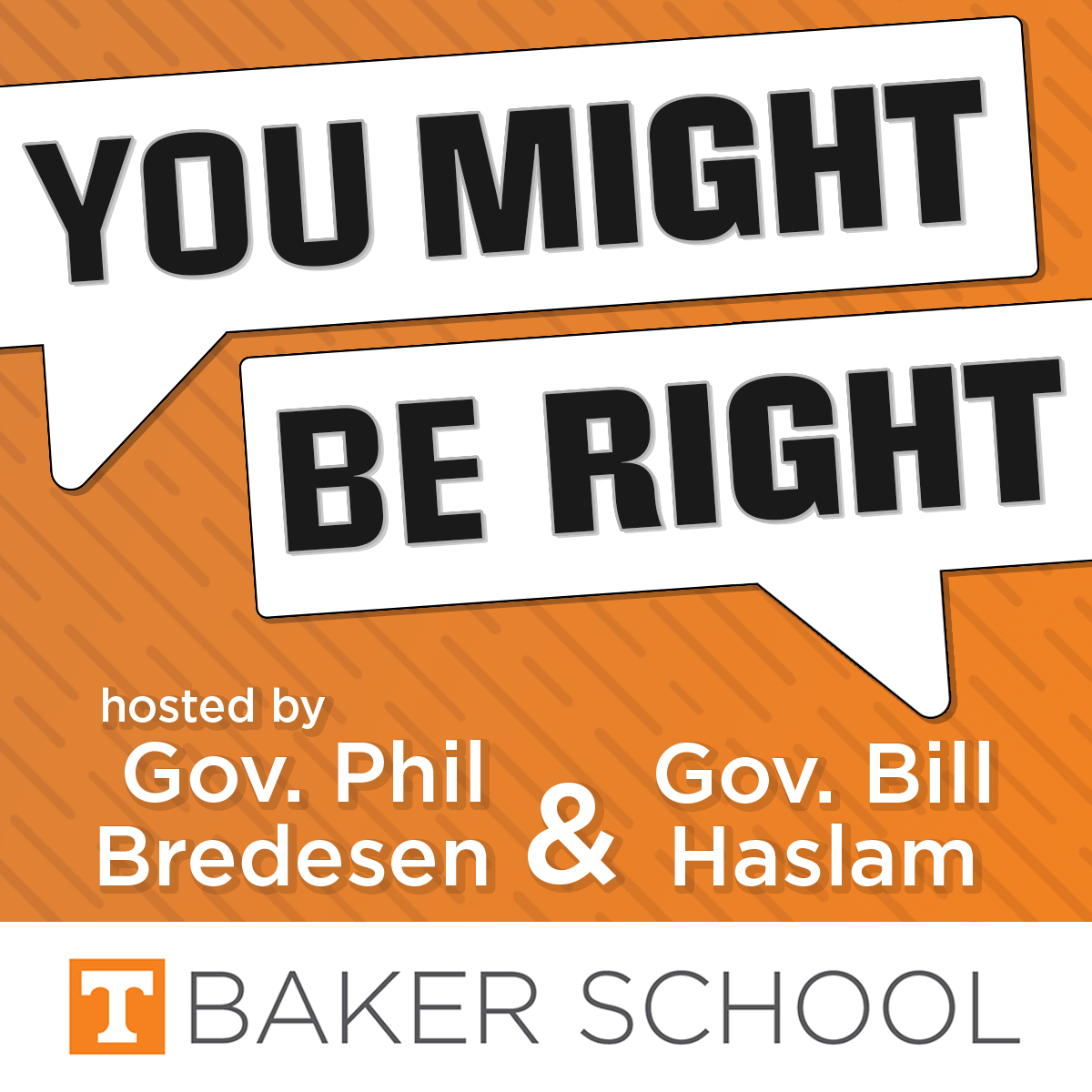What’s the History and Future of Presidential Debates?
In this episode, our hosts, former Tennessee Governors Phil Bredesen and Bill Haslam, discuss the history, significance, and future of presidential debates with Frank Fahrenkopf, co-chairman of the Commission on Presidential Debates.
Televised debates have been instrumental in shaping the course of presidential elections for decades, providing voters with a platform to evaluate the candidates and sometimes producing decisive moments that boosted one candidate and doomed another. For the first time since 1987, campaigns for the major party candidates have agreed to network-hosted debates on their own, removing the nonpartisan, nonprofit Commission on Presidential Debates from the process.
Subscribe and follow You Might be Right wherever you get your audio content – including Apple Podcasts and Spotify – to never miss an episode, or sign up for our email list to receive new episodes straight to your inbox each week here.
“It’s the perception of the candidate as a human being…and where they stand on the issues”
Fahrenkopf opened the conversation by noting that polling consistently shows how impactful the presidential debates are, with about 65-70% of people saying the debates are an important factor when deciding whom to vote for.
“I’ve always viewed the debates of being not only a question of the candidates indicating to the public where they stood on issues that are important to the public, whose position might affect how they vote, but it also tells you something about the candidate,” he told Governors Bredesen and Haslam. “Seeing the candidate on the stage, participating in a discussion, tells you a lot about character, tells you a lot about how they conduct themselves under pressure and so forth. So, there’s two things: it’s the perception of the candidate as a human being, as a possible person they want to have to be president, and where they stand on the issues.”
“One purpose and one purpose only”
Fahrenkopf detailed how the Commission came to be, explaining how “a great deal of disharmony, a great deal of problems” over the details of the presidential debates organized by the League of Women Voters in 1984 – including that the two campaigns vetoed the involvement over 100 journalists – helped spark the formation of two different study committees that looked at the process of how we elect presidents.
“It wasn’t just the debates, but they did come to one thing that both sides agreed on individually, that there should be created an entity that exists for one purpose and one purpose only, and that is to ensure that every four years, there are held general election presidential and vice presidential debates,” he said.
Fahrenkopf, then the chairman of the Republican National Committee, and Paul Kirk, then chairman of the Democratic National Committee, were approached to serve as co-chairs of what became the Commission on Presidential Debates.
“We’re just going to have to watch and see”
Since its creation in 1987, the Commission had overseen every general election debate – until May 2024, when the two major party campaigns announced that they had agreed to network-produced debates, without the Commission’s involvement. What led to that decision? While acknowledging there has been “controversy throughout different times,” Fahrenkopf noted “some legitimate criticism” of the timing of the debates four years ago, when the first one was held after some states had already started early voting. In response, he said, the Commission had scheduled its earliest-ever first debate this year, for September 16.
But now, that debate may not happen as the Commission takes a “wait and see” approach to the CNN-hosted debate on June 27th. “Have they come up with a way to have a good debate that will help educate the American people? If it does, if they do the job, we may say, ‘Hey, congratulations,’ and we’ll fade away,” Fahrenkopf said. “But we’re just going to have to watch and see.”
“We lose that education touch, which we think is very, very important.”
How will network-produced debates differ from events organized by the Commission? Fahrenkopf pointed to a range of factors including the potential implications for viewership, the loss of the town-hall meeting format (“the most popular debate that we’ve ever used,” he said), the introduction of commercial breaks, and that historically, most Americans do not start focusing on the presidential election until after Labor Day.
“We also lose the fact that we have always done them on college campuses,” Fahrenkopf added. “It’s an enthusiasm among students, we start really talking about the history of our nation and how we got to where we are, and also, special classes on civics, which I don’t think are being taught enough in our schools across the country. So, we lose that education touch, which we think is very, very important.”
Subscribe and follow You Might be Right wherever you get your audio content – including Apple Podcasts and Spotify – to never miss an episode, or sign up for our email list to receive new episodes straight to your inbox each week here.

Join the conversation on Twitter by following @UTBakerSchool, @PhilBredesen, and @BillHaslam.


